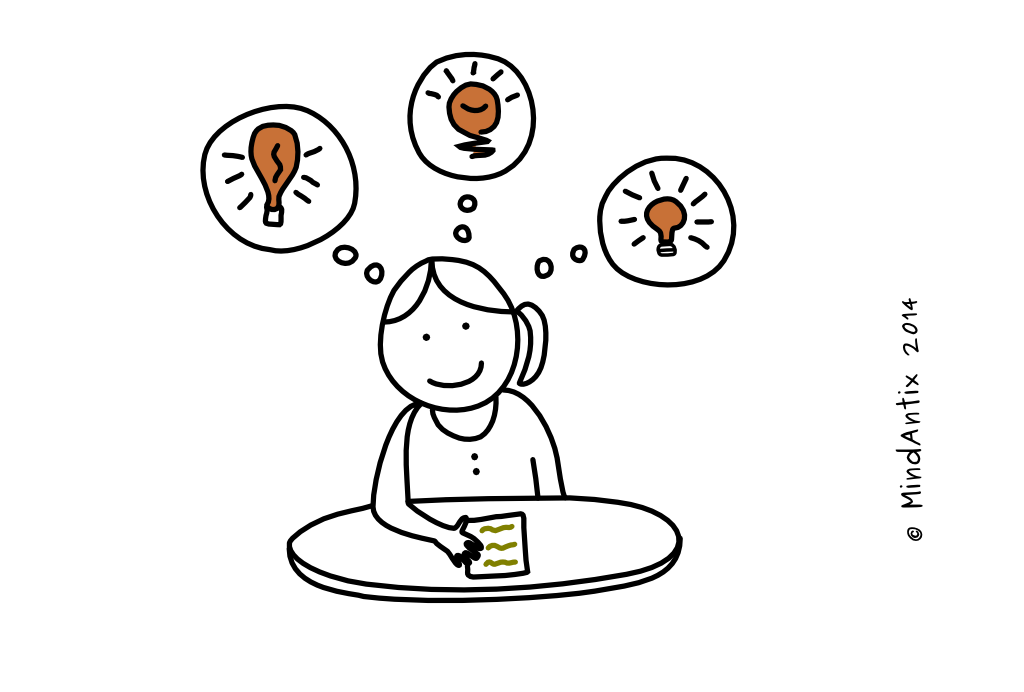In my last blog, I covered some of the cognitive reasons that hinder creative idea-generation. But there is another aspect – a social aspect – that makes brainstorming tricky. As part of coaching for Destination Imagination, I often found myself in this (familiar) situation – you ask your group a question and after the first couple of answers, everyone starts giving similar answers. As a result, you only get a few original ideas while plenty others aren’t even considered. Why does that happen and how do you get out of that mode?
Brainstorming was the brainchild of Alex Osborn, an advertising executive, who had pioneered the technique at his agency. To have an effective brainstorming session, Osborn proposed working in groups of six to ten and following four principles: “deferment of judgement”, “quantity breeds quality”, “free-wheeling is encouraged” and “combination and improvement are sought”. In essence, Osborn advocated focusing on generating as many ideas as possible, including wild and outlandish ones, while avoiding any criticisms and by building on each others’ ideas.
Osborn’s book outlining his brainstorming technique became an instant bestseller and brainstorming was quickly adopted in companies. However, decades of research since then has shown that brainstorming doesn’t really produce the great results people had envisioned. In fact, when people are asked to brainstorm individually and then bring their best ideas to the group, the outcome is significantly superior. They produce twice as many ideas and have more novel ideas. So, what stops brainstorming from working well?
Adrian Furnham, a professor of Psychology at University College London, outlines three main problems that plague brainstorming:
- Social Loafing: Social loafing occurs because people working in groups tend to exert less effort than when they are working alone. When people expect others to loaf, they reduce their own effort to make the division of labor more equitable.
- Evaluation Apprehension: People can hold back their ideas and views when they are uncertain of how they will be perceived. Presence of superiors in the session increases evaluation apprehension in the rest.
- Production Blocking: Production blocking occurs because in traditional brainstorming, only one person is allowed to speak at a time and the others have to wait. The waiting time can cause people to forget their idea (short-term memory limitation) or to consider it less original than the idea being considered.
So, how can you get better at generating ideas? Here are some approaches that work better than traditional brainstorming:
- Work Individually: When people work individually and then bring their best ideas to the group for assessment, the outcome is superior to a group brainstorming session. As Adrian Furnham recommends, “If you have talented and motivated people, they should be encouraged to work alone when creativity or efficiency is the highest priority.”
- Brainwriting: Shelly Carson, a psychologist at Harvard, suggests using Brainwriting. In brainwriting, participants are use index cards to jot down a few ideas and then pass their cards to the next participant who then uses them as triggers for more ideas.
- Electronic Brainstorming: Electronic techniques are increasingly being used to help overcome the problems of social loafing, evaluation apprehension and production blocking. In typical electronic brainstorming, participants type their ideas anonymously and ideas from all group members are pooled and displayed to everyone.
In our case, I discovered that evaluation apprehension was limiting the number of ideas our group was generating. What eventually worked for us was “working individually” – each team member would think about a specific part of the challenge and bring his or her ideas to the next meeting to share with the rest of the group. We found that not only did we have more ideas, we also had better ideas because people had time to refine and improve their initial thoughts. So, the next time you find yourself brainstorming, try one of these tweaks and see if it works better.

